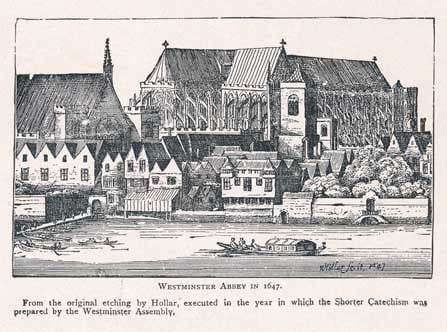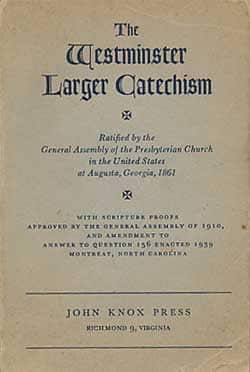This Day in Presbyterian History:
A Prayer becomes a Catechism Answer
 It was a traditional story brought down through the ages that a Scotch delegate to the Westminster Assembly had joined the other divines in a day of Bible study and prayer when they had arrived at the definition of God. In this action, they readily acknowledged that they needed the divine help of God. As the traditional story states, George Gillespie, one of only a few Scottish divines, stood up to pray and uttered that “God is a Spirit, infinite, eternal, and unchangeable, in his being, wisdom, power, holiness, justice, goodness and truth.” Thus, when they came to the Catechism section, the court reporter had these memorable words to answer the question, “What is God?”
It was a traditional story brought down through the ages that a Scotch delegate to the Westminster Assembly had joined the other divines in a day of Bible study and prayer when they had arrived at the definition of God. In this action, they readily acknowledged that they needed the divine help of God. As the traditional story states, George Gillespie, one of only a few Scottish divines, stood up to pray and uttered that “God is a Spirit, infinite, eternal, and unchangeable, in his being, wisdom, power, holiness, justice, goodness and truth.” Thus, when they came to the Catechism section, the court reporter had these memorable words to answer the question, “What is God?”
Whether the story if true or not, we know that God is a Spirit, and has not a body like man. The first four words of this sentence come directly from the lips of the Lord Jesus as He spoke to the Samaritan woman at the well. He said that God being a Spirit, we need to worship Him in spirit and in truth. (John 4:24) The last seven words come from the Children’s Catechism, and in simple childlike concepts, helps us to understand the person of God.
 Then we are reminded from Scripture of His incommunicable attributes, or those descriptions which only describe Him and no one else. He is “infinite, eternal, and unchangeable.” None of these have been given to mankind. They are uniquely belonging to God. Study these three attributes from Scripture, such as Psalm 90:2 and Malachi 2:6, and you will have much to adore your God in praise and prayer.
Then we are reminded from Scripture of His incommunicable attributes, or those descriptions which only describe Him and no one else. He is “infinite, eternal, and unchangeable.” None of these have been given to mankind. They are uniquely belonging to God. Study these three attributes from Scripture, such as Psalm 90:2 and Malachi 2:6, and you will have much to adore your God in praise and prayer.
Then the communicable attributes of God are stated in His being, wisdom, power, holiness, justice, goodness, and truth. Study these attributes of God from Scripture, such as Exodus 3:14 and Psalm 147:5 and Revelation 4;8 and Revelation 15:4; and Exodus 24:6, 7, and you will have much to adore your God and Father in praise and prayer. And yet, we have called these attributes communicable. That is because God shares these descriptions with us. We are to be like Him in our being, wisdom, power, holiness, justice, goodness, and truth.
The young man stood before the door with a typical questionnaire to open the door of the heart to questions about the woman’s soul. He didn’t know however that answering that door that afternoon was a Presbyterian pastor’s wife and one who had been brought up in the Shorter Catechism. When he came to the question, “what is God to you?”, she answered with the words of this catechism by memory. He was overwhelmed with her answer and kept interrupting her so that he could write down the words. When she finished, he literally ran from the door, not finishing his questionnaire, because of the majestic nature of her answer. As Charles Hodge said, “this is the best definition of God penned by man.” And so it is.
 Setting aside for the moment any discussion of worthwhile Presbyterian figures or events for this February 11th day, we can think of no better topic than these catechism words.
Setting aside for the moment any discussion of worthwhile Presbyterian figures or events for this February 11th day, we can think of no better topic than these catechism words.
Words to Live By: Ministers in their pastoral prayer have this answer a perfect one to begin their public prayers. Individual Christians can take one of these words and thoughts to adore when they intercede with the Lord God Almighty. We have a great and glorious Father.
Through the Scriptures: Leviticus 8 – 10
Through the Standards: Punitive providence
WCF 5:6
“As for those wicked and ungodly men whom God, as a righteous God, for former sins, doth blind and harden, from them He not only withholdeth His grace whereby they might have been enlightened in their understandings, and wrought upon in their hearts; but sometimes also withdraweth the gifts which they had, and exposeth them to such objects as their corruption make occasion of sin; and, withal, gives them over to their own lusts, the temptations of the world, and the power of Satan, whereby it comes to pass that they harden themselves, even under those means which God useth for the softening of others.”
Image sources : “Westminster Abbey in 1647” – frontispiece plate for The Grounds and Principles of Religion contained in a Shorter Catechism according to the advice of The Assembly of Divines at Westminster, edited by William Carruthers. London, 1913 ; Covers of Catechism for Young Children. Philadelphia, n.d. and The Westminster Larger Catechism. Richmond, 1939. All digital scans by the staff of the PCA Historical Center.
